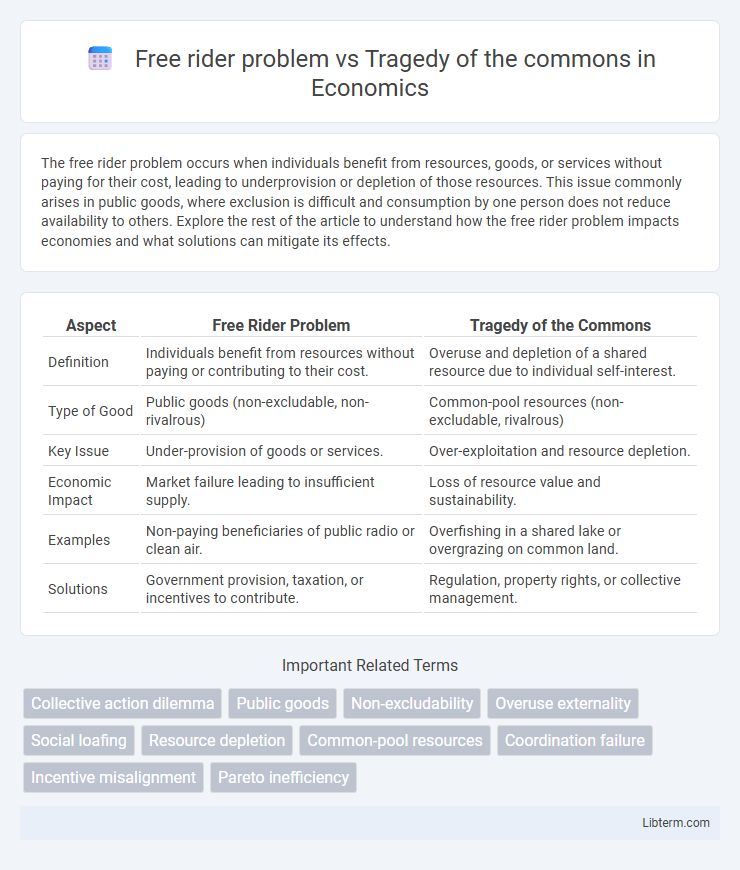The free rider problem occurs when individuals benefit from resources, goods, or services without paying for their cost, leading to underprovision or depletion of those resources. This issue commonly arises in public goods, where exclusion is difficult and consumption by one person does not reduce availability to others. Explore the rest of the article to understand how the free rider problem impacts economies and what solutions can mitigate its effects.
Table of Comparison
| Aspect | Free Rider Problem | Tragedy of the Commons |
|---|---|---|
| Definition | Individuals benefit from resources without paying or contributing to their cost. | Overuse and depletion of a shared resource due to individual self-interest. |
| Type of Good | Public goods (non-excludable, non-rivalrous) | Common-pool resources (non-excludable, rivalrous) |
| Key Issue | Under-provision of goods or services. | Over-exploitation and resource depletion. |
| Economic Impact | Market failure leading to insufficient supply. | Loss of resource value and sustainability. |
| Examples | Non-paying beneficiaries of public radio or clean air. | Overfishing in a shared lake or overgrazing on common land. |
| Solutions | Government provision, taxation, or incentives to contribute. | Regulation, property rights, or collective management. |
Introduction to Collective Action Problems
The free rider problem occurs when individuals benefit from resources or services without paying for their cost, undermining public goods provision. The tragedy of the commons describes a scenario where individual users overexploit a shared resource, leading to depletion or degradation. Both are classic examples of collective action problems, where individual rationality conflicts with collective well-being and efficient resource management.
Defining the Free Rider Problem
The Free Rider Problem occurs when individuals benefit from resources, goods, or services without paying their fair share, leading to under-provision or depletion. This issue often arises in public goods scenarios where exclusion is difficult and usage is non-excludable, causing rational actors to avoid contributing. Unlike the Tragedy of the Commons, which involves overuse and degradation of shared resources, the Free Rider Problem centers on the reluctance to support collective funding.
Understanding the Tragedy of the Commons
The Tragedy of the Commons describes a scenario where individuals overuse a shared resource, leading to its depletion or degradation due to lack of collective management or regulation. This concept highlights the conflict between personal interests and the common good, emphasizing the necessity of sustainable resource governance to prevent environmental collapse. Unlike the Free Rider Problem, which involves benefiting from resources without contributing to their upkeep, the Tragedy of the Commons centers on the destructive consequences of unregulated access to communal resources like fisheries, forests, and clean air.
Key Differences Between Free Rider Problem and Tragedy of the Commons
The free rider problem arises when individuals consume a shared resource or benefit from a public good without contributing to its provision or maintenance, leading to underfunding or depletion. The tragedy of the commons describes a scenario where multiple users, acting independently and rationally according to self-interest, overexploit a shared resource, resulting in its degradation or destruction. Key differences include that the free rider problem primarily centers on non-contribution to public goods, while the tragedy of the commons involves overuse and depletion of common-pool resources.
Real-World Examples of the Free Rider Problem
The free rider problem occurs when individuals benefit from resources or services without paying for them, such as when people use public transportation without contributing to its funding. In contrast, the tragedy of the commons involves overuse and depletion of shared resources, like overfishing in international waters leading to declining fish populations. Real-world examples of the free rider problem include taxpayers evading taxes yet enjoying public goods like national defense and clean streets, or individuals streaming pirated content without supporting creators.
Illustrative Cases of the Tragedy of the Commons
The Tragedy of the Commons manifests vividly in overfishing where individual fishermen deplete shared fish stocks, undermining long-term sustainability. Another example involves air pollution, where factories emit toxic gases without bearing full societal costs, leading to widespread health and environmental damage. Urban traffic congestion also exemplifies this dilemma as each driver seeks personal convenience, collectively causing excessive delays and increased emissions.
Underlying Economic Theories
The free rider problem arises from public goods theory, where individuals consume a good without paying, leading to under-provision due to non-excludability and non-rivalry. The tragedy of the commons is rooted in common-pool resource theory, characterized by rivalrous but non-excludable resources, resulting in overuse and depletion as individuals act in self-interest. Both concepts illustrate market failures driven by externalities and the lack of property rights, necessitating collective action or regulation to ensure efficient resource allocation.
Solutions and Policy Approaches
Addressing the Free Rider Problem often involves implementing mechanisms like user fees, mandatory contributions, or providing selective incentives to ensure individuals contribute to public goods. Solutions to the Tragedy of the Commons typically require regulatory approaches such as establishing property rights, enforcing quotas, or community-based resource management to prevent overexploitation. Policy strategies for both issues emphasize monitoring, enforcement, and institutional frameworks that promote cooperation and sustainable resource use.
Impacts on Public Goods and Resource Management
The Free rider problem leads to under-provision of public goods as individuals consume benefits without contributing to costs, resulting in funding shortages and inefficiency. The Tragedy of the commons causes overconsumption and depletion of shared resources due to lack of individual incentives to conserve, threatening sustainability and long-term availability. Both issues undermine effective resource management and require collective action or regulatory interventions to ensure equitable access and preservation of public goods and common-pool resources.
Conclusion: Navigating Collective Action Challenges
Understanding the free rider problem and the tragedy of the commons is crucial for addressing collective action challenges effectively. Both phenomena highlight the tension between individual incentives and collective welfare, necessitating targeted interventions like regulation, community management, or incentive restructuring. Navigating these challenges requires balancing enforcement mechanisms with cooperative frameworks to ensure sustainable resource use and equitable contributions.
Free rider problem Infographic

 libterm.com
libterm.com